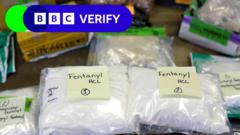In Sinaloa, Mexico, cartel operatives have resorted to testing potentially lethal fentanyl concoctions on the homeless, as regulatory crackdowns force them to innovate production methods. Reports reveal shocking accounts of individuals lured with money to subject themselves to experimental drugs, highlighting a grim reality of the ongoing narcotics crisis.
Mexican Cartels Put Lives at Risk: Fentanyl Testing on the Vulnerable

Mexican Cartels Put Lives at Risk: Fentanyl Testing on the Vulnerable
Global efforts against fentanyl are leading cartels to dangerous experimentation, targeting both humans and animals to refine their illicit drugs.
Mexican cartels are increasingly turning to desperate measures to sustain their fentanyl operations as global efforts to combat the opioid crisis tighten. In Culiacán, Sinaloa, the heart of cartel territory, individuals are approached with disturbing propositions by cartel operatives offering money in exchange for testing experimental fentanyl mixtures.
Pedro López Camacho, a resident of a local homeless encampment, described the chilling scenario where operatives visited daily with syringes filled with their latest formulations. Offering up to $30, they persuaded vulnerable individuals to inject themselves, capturing live reactions for observations. Many, including Camacho, survived the ordeal, but others reportedly succumbed to the effects of the potent substances.
The cartel’s methods have evolved in response to increased restrictions on precursor chemicals from China, which have made it more challenging to procure the materials necessary for fentanyl production. To adapt, cartel chemists are now experimenting with a wider array of additives, some of which are dangerously toxic. In a worrying trend, these cooks are reportedly testing their formulations not only on humans but also on animals such as rabbits and chickens.
As the cartels push the boundaries of their operations, the implications for public health and safety remain dire, raising critical questions about the effectiveness of current drug enforcement strategies. The human toll of such reckless testing mirrors the ongoing crisis that continues to devastate communities across the region.



















